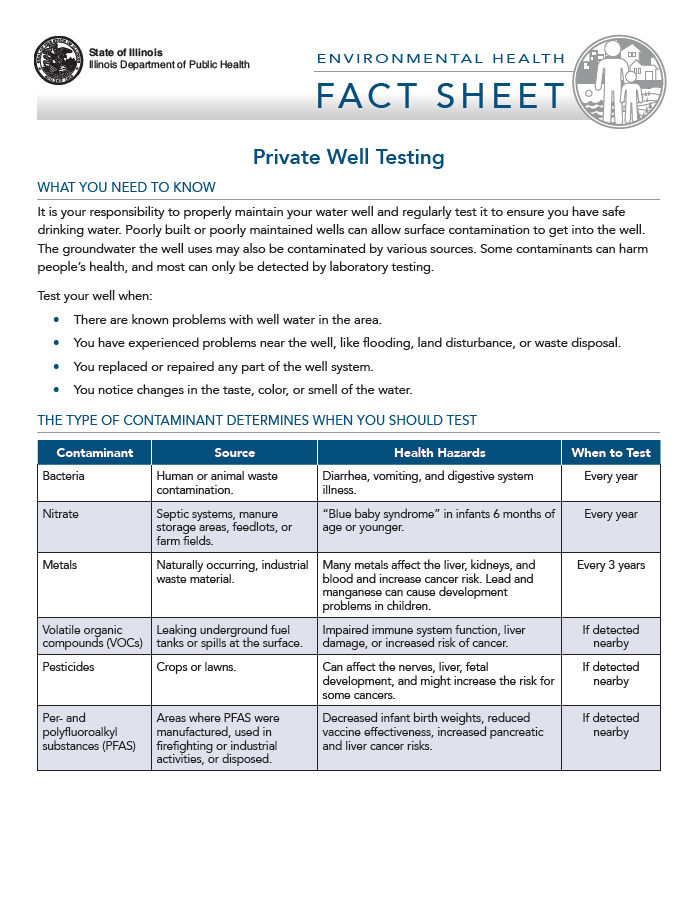Private Well Testing
What You Need to Know
It is your responsibility to properly maintain your water well and regularly test it to ensure you have safe drinking water. Poorly built or poorly maintained wells can allow surface contamination to get into the well. The groundwater the well uses may also be contaminated by various sources. Some contaminants can harm people’s health, and most can only be detected by laboratory testing.
Test your well when:
- There are known problems with well water in the area.
- You have experienced problems near the well, like flooding, land disturbance, or waste disposal.
- You replaced or repaired any part of the well system.
- You notice changes in the taste, color, or smell of the water.
The Type of Contaminant Determines When You Should Test
| Contaminant | Source | Health Hazards | When to Test |
|---|---|---|---|
| Bacteria | Human or animal waste contamination. | Diarrhea, vomiting, and digestive system illness. | Every year |
| Nitrate | Septic systems, manure storage areas, feedlots, or farm fields. | “Blue baby syndrome” in infants 6 months of age or younger. | Every year |
| Metals | Naturally occurring, industrial waste material. | Many metals affect the liver, kidneys, and blood and increase cancer risk. Lead and manganese can cause development problems in children. | Every 3 years |
| Volatile organic compounds (VOCs) | Leaking underground fuel tanks or spills at the surface. | Impaired immune system function, liver damage, or increased risk of cancer. | If detected nearby |
| Pesticides | Crops or lawns. | Can affect the nerves, liver, fetal development, and might increase the risk for some cancers. | If detected nearby |
| Per- and polyfluoroalkyl substances (PFAS) | Areas where PFAS were manufactured, used in firefighting or industrial activities, or disposed. | Decreased infant birth weights, reduced vaccine effectiveness, increased pancreatic and liver cancer risks. | If detected nearby |
Find Help to Get Your Well Tested
Most local health departments can help test for bacteria and nitrate. Find your local health department by searching the internet or go to the Illinois health department directory.
Commercial labs also test well water, and might be the only option for detecting certain contaminants. The Illinois Department of Public Health (IDPH) can help you select the right lab.
Testing for contaminants can be expensive. IDPH can help interpret test results and provide appropriate recommendations for free. IDPH cannot require you to test your well, install treatment, or keep you from using your well.
Reduce Your Exposure to Contaminants to Protect Your Health
Take the following steps to reduce exposure when these contaminants are detected at levels of concern:
- Bacteria – Boil water before using it for drinking and cooking. Disinfect the well.
- Nitrate – Do NOT boil the water; boiling concentrates nitrate levels. Do NOT give your well water to infants 6 months of age or younger. Advanced treatment will be required to remove nitrate.
- Metals, VOCs, pesticides, and PFAS – Install water treatment systems, change water use, or use alternative sources of water. Recommendations may vary based on the type and level of contamination.
Water treatment systems must comply with the Illinois Plumbing Code. If you cannot install them yourself, they must be installed by an Illinois-licensed plumber. Contact IDPH for help interpreting test results and guidance on reducing your exposure to contaminants.
Where Can I Get More Information?
Illinois Department of Public Health
Division of Environmental Health
525 W. Jefferson St.
Springfield, IL 62761
(217) 782-5830
TTY (hearing impaired use only) 800-547-0466
DPH.Tox@illinois.gov
http://www.dph.illinois.gov/



